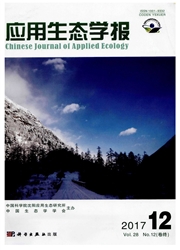

 中文摘要:
中文摘要:
随着气候变暖,十字花科作物种植区北移,小菜蛾成为我国北方地区的重要害虫.远距离迁飞不仅引起小菜蛾大面积突然爆发,而且增大了抗药性基因扩散范围,导致抗药性大面积发展.阐明小菜蛾远距离迁飞对于早期监测预警与综合防治策略制订有重要意义.迄今为止,我国尚未对小菜蛾迁飞开展系统研究.本文总结了国内外有关小菜蛾远距离迁飞的研究结果,提出了小菜蛾远距离迁飞的证据:1)在冬季寒冷地区(如日本北部、加拿大西部和中国东北),小菜蛾无法越冬,推测翌年春季大量发生虫源是远距离迁飞而至;2)在海上观察船、山顶、海岛上或空中捕获到小菜蛾成虫,或直接观察到数量巨大的蛾群,为小菜蛾远距离迁飞提供了直接证据;3)小菜蛾地面成虫突增与昆虫远距离迁飞的适宜气象条件(如夜间逆温层、锋线过境等)相一致,为小菜蛾的远距离迁飞提供了适宜条件;4)垂直昆虫雷达识别的目标昆虫特征与小菜蛾的实验室测量特征和地面诱捕数据相吻合;5)小菜蛾不同地理种群的生物学性状和基因差异程度与地理距离无关,推测不同地点的小菜蛾之间进行频繁的基因交流;6)吊飞试验表明,小菜蛾具有远距离迁飞所需的飞行能力,且寄主植物的适合度下降可能是诱发小菜蛾迁飞的原因之一.最后展望了未来的研究方向:构建小菜蛾远距离迁飞轨迹模型,明确小菜蛾在我国远距离迁飞的路径;研究小菜蛾远距离迁飞的生理生化和生态学基础;提出小菜蛾迁飞条件下的种群抗药性治理策略.
 英文摘要:
英文摘要:
As cruciferous plants have been cultivated northwards due to climate warming, diamondback moth (DBM) Plutella xylostella is becoming a major pest in North China. The long distance migration of DBM not only induces its sudden outbreak over extensive areas, but also leads to its insecticide resistance by the spread of resistant genes in large area. To elucidate the long distance migration of DBM is of significance for early warning and decision-making in integrated pest managements. So far, the migration of DBM has not yet been systematically investigated in China. Here, we reviewed the literatures about the long distance migration of DBM at home and abroad, and summarized the related evidence: 1) DBM cannot overwinter in cold regions such as northern Japan, western Canada, and northeast China, where the DBM outbreak is presumed from elsewhere by long distance migration, 2) DBM adults are captured from seas, mountain tops, sea islands, and sky, etc., and the collection of large quantity of DBM presents the powerful direct evidence of DBM long distance migration, 3) the sudden increase of DBM in fields is consistent with the meteorological conditions such as the presence of nocturnal temperature inversion layer and the front passage, suggesting that these meteorological conditions supply suitable backgrounds for the insect migration, 4) the target insect characters identified by vertical insect looking radar is consistent with the measured DBM characters in laboratory and the trapping data from fields, confirming the long distance migration of DBM, 5) the biological characteristics and genetic variations of different DBM populations have no correlations with geographic distance, suggesting the frequent gene flows among the populations in different positions, and 6) the flight test of DBM indicates its long distance flight capacity, and the decreasing fitness of host plants is probably one of the trigger factors for the migration of DBM. Some future research directions are prospected: the construc
 同期刊论文项目
同期刊论文项目
 同项目期刊论文
同项目期刊论文
 期刊信息
期刊信息
